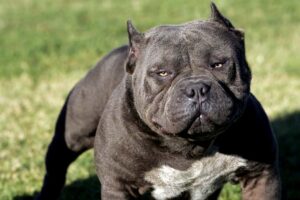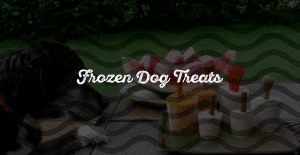Dogs can develop an unpleasant smell in many ways, including rolling around in something, getting sprayed by a skunk, or from plain being dirty.
These smells can be explained by dogs just being dogs, who have been known to eat feces, dead animals, and to roll around in similar things for reasons unknown.
Their curiosity and playfulness get them smelling bad, quickly. But a fishy smell is a sure sign of something quite specific, and it isn’t something you can simply wash off. That fish smell is from anal gland secretions.
Yes, this is the dirty side of having a dog in the family.
What Are Canine Anal Glands?
Canines have anal glands on each side of their anus that resembled small sacs. Anal glands are similar to sweat glands and they produce a hormone that is a marker for your dog.
Anal gland secretions are passed on through feces and will let other dogs know information about the dog that left the feces. Your dog has their own scent, which they use to mark their territory, or to attract a mate. Dogs use their sense of smell to store memories and to learn and explore their environment.
These glands and the scent they secrete are the reason why dogs sniff each other’s butts. They store that scent information in their memories so that they can know that other dog in a more personal way.
From these smells, they can tell friend from foe, where territories begin and end, find a mate, and to help them find food. (Which is the main motivation)
What is Anal Gland Expression?
Anal glands can be expressed involuntarily when a dog is scared or startled. This is completely normal, and you probably won’t even realize it happened, except for the fishy smell that is left in the air. If your dog begins to smell like a fish constantly, their anal glands may need to be expressed manually due to a blockage.
Another thing you’ll notice your dog doing is scooting their butt on the floor or outside. Dogs don’t do that to scratch an itch. They know that they need to express their anal glands, and they put pressure on the area to do so. It’s gross, but it is best to clean the area right away, so that the oils from the anal glands don’t seep into the flooring. The smell will get worse, and turn into more of an ammonia, urine-like smell that is hard to get rid of.
If you notice a fishy smell about your dog, take them to the veterinarian for a simple anal gland expression. The veterinarian will express the glands manually and check to see if there are signs of impaction, infections, tumors, or anal sac disease.
Anal Gland Impaction
Anal glands can become impacted and not able to express properly with defecation or otherwise. When the veterinarian manually expresses the sacs, an impaction will be evident if the glands are very hard to the touch and a thin, brown, ribbon of paste material comes out of them.
Anal gland impaction is common in dogs, but more prevalent in small dog breeds. Impaction can occur because of a naturally occurring abnormality in your dog’s glands or because their feces is too soft to properly express the glands when passed. Overweight dogs have an increased risk of their anal glands being impacted.
Anal Gland Infection
Anal glands can get infected when they are impacted and not expressed. Infections can cause painful abscesses that cause the glands to be swollen, discolored, and painful. If an abscess is not treated it can rupture through the skin causing more pain, bleeding, and discomfort.
When this happens, your dog will need rounds of medications, and probably a cone around their neck, so that they don’t lick or bite the infected area.
Anal Gland Tumors
Tumors in the anal glands present often as anal gland impactions at first. The anal gland sacs will be hard to the touch and the glands may not express on their own. Your veterinarian will try manual expression to rule out impaction. If the veterinarian is not able to express the glands, he may want to order a biopsy or to perform an ultrasound to ensure that a tumor is not growing in the glands.
These types of tumors aren’t life-threatening, and are usually treated by removing the tumor, so that the gland can work properly.
Anal Sac Disease
Anal Sac Disease refers to an infection or abscess in your dog’s anal glands that usually begins as an impaction. Anal sac disease often occurs when impactions are frequent and left untreated. If the infections turn into abscesses, these can be treated. However, if problems keep occurring your dog may need surgery to remove their anal glands.
Symptoms of Anal Sac Disease:
One of the most common symptoms of anal sac disease, and one of the first you will notice, is a fishy smell coming from your dog. You may first think this smell is passing gas, but a fishy smell is indicative of an impacted anal gland. Other symptoms include:
- Dog scooting their butt on the floor
- Biting at their butt
- Constipation
- Pain when pooping or sitting
Treating Anal Sac Disease:
The treatment for anal sac disease depends on the progression of the disease. When your dog first has an impaction and needs their anal glands manually expressed the veterinarian might suggest you add more fiber to your pet’s diet to harden and enlarge their feces. You will also be told to exercise your dog more as obese dogs are at a greater risk of having anal gland problems.
Preventing Anal Sac Disease
As long as your dog’s anal glands are normal, they can avoid anal sac disease by maintaining a healthy weight, having enough fiber in their diet, and getting plenty of exercise.
In Conclusion…
If you notice any type of funky smell coming from your dog that isn’t the smell of feces or passing gas, then it is best to contact your veterinarian to see what’s going on with them. Before you do that, make sure that they are clean so you can rule out them being dirty. There isn’t a need to worry, though. All of these problems may be yucky, but they are easily treatable and aren’t life-threatening. Your fur baby is still a good boy/girl.










